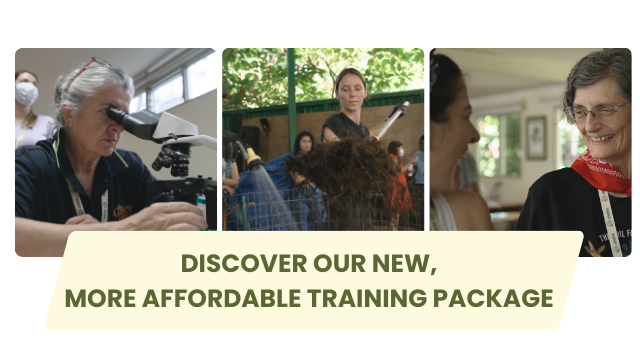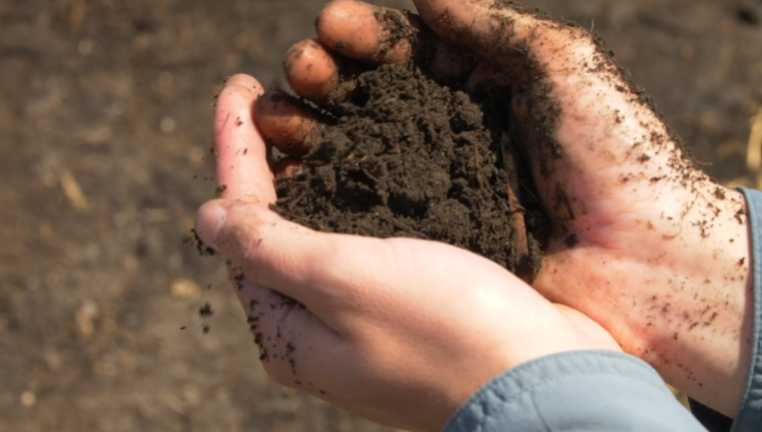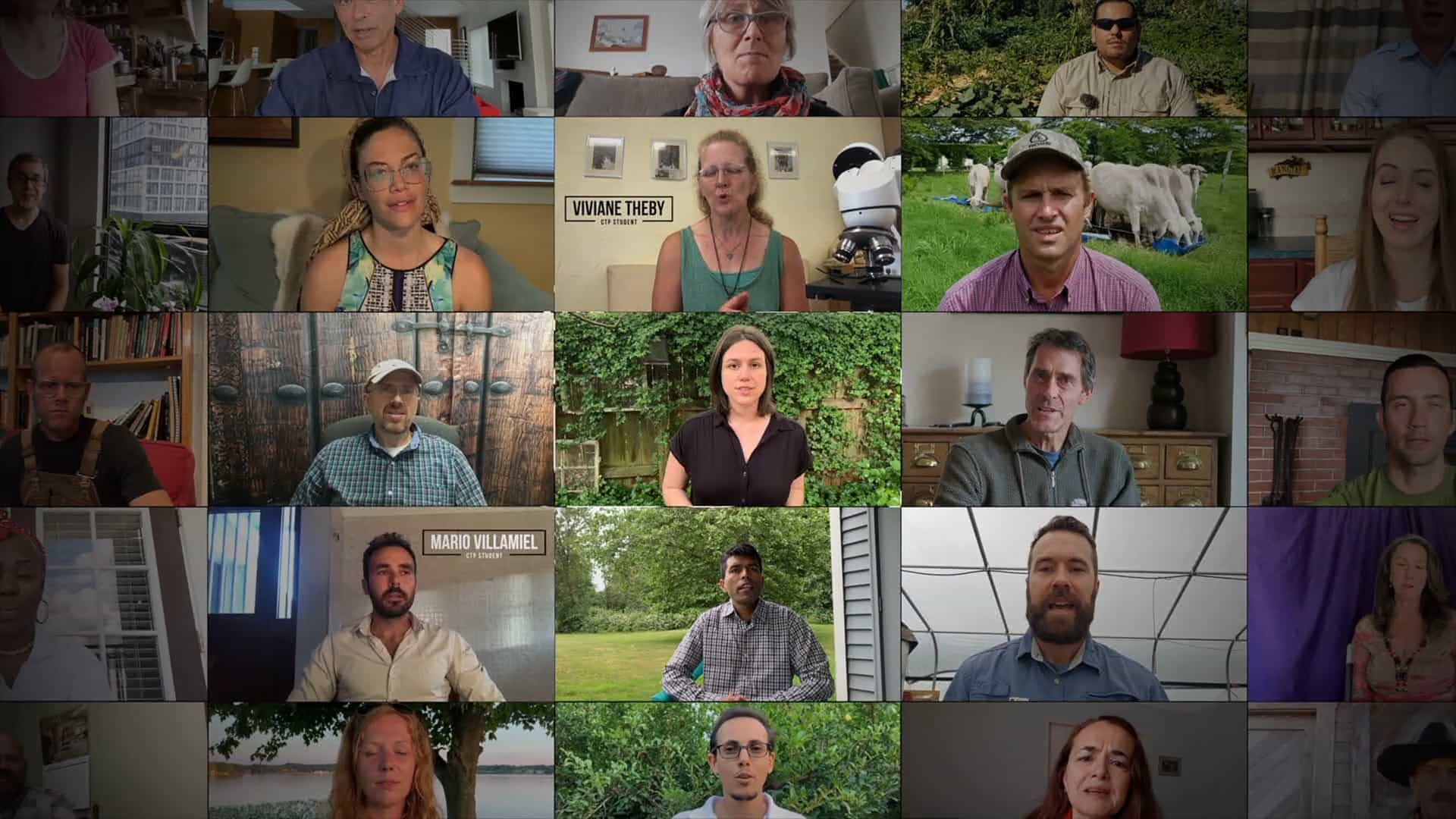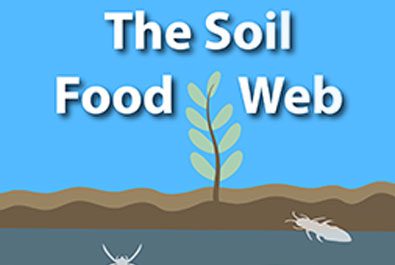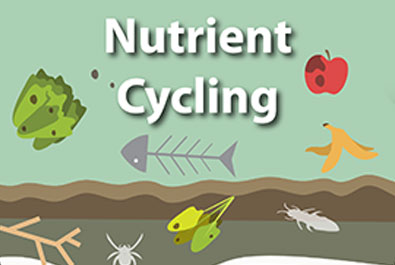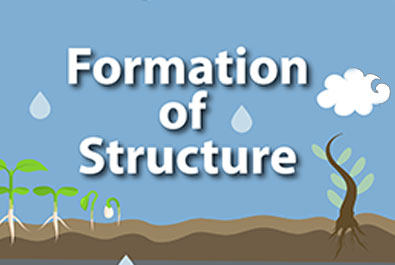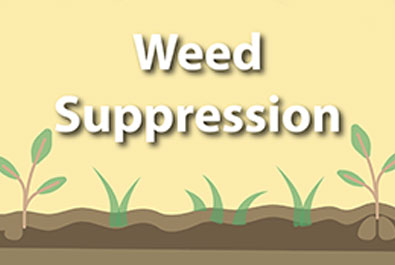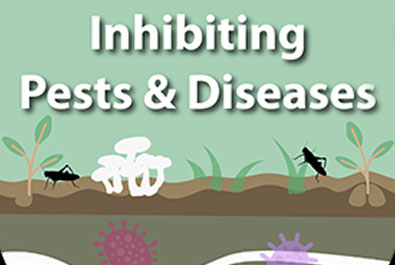Call to reach our student support team
Regenerative Farmer Package
BUILD SOIL HEALTH THAT WILL LAST FOR GENERATIONS
with Dr. Elaine Ingham’s Soil Food Web Approach
Case Studies
Whether you’re growing on a small scale or large, alfalfa or almonds, United States or United Emirates, the Soil Food Web system simply works. Watch these short case studies to hear more…
Farmer Case Studies
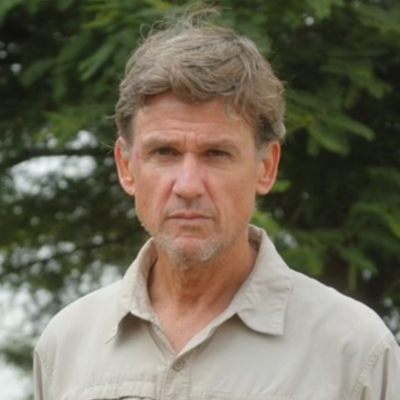
Roberto Silva Rodriguez

Adam York
10,000 acres Illinois, USA
York Farms is a multi-generational family farm growing soy and corn. Adam reported saving over $1M by reducing chemical inputs in the first 3 years. He subsequently expanded his operation to service 100,000 acres of surrounding farms.
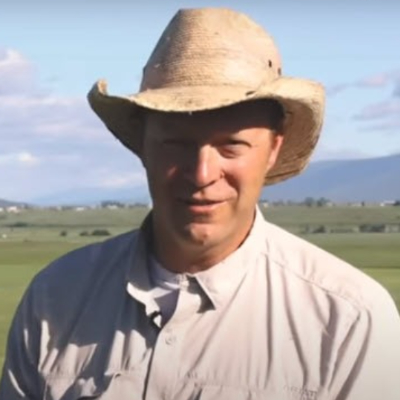
Cory Miller
3,000 acres Montana, USA
Cory operates Grass Valley Farms where he produces high quality hay, beef, eggs and honey. He’s seen multiple improvements each year, since he stared working with Consultant Casey Ernst.

Nick Padwick
1,000 acres Norfolk, UK
Nick has been in large scale farming for over 40 years. In this webinar he talks about his huge composting operation with over 1.5 miles of windrows currently in production, and how he’s able to treat 1,000 acres in under two days using the custom equipment he’s developed.
Not a Farmer, Rancher, or Grower?
Interested in becoming a Soil Food Web Consultant,
Lab-Tech, or Biological Compost Producer?
Click here to learn more.
Farmers Around the World are Struggling to Find a Better Way
These critical issues, along with demand for ecologically produced foods, are motivating farmers, ranchers, and growers to switch to Regenerative Agriculture.
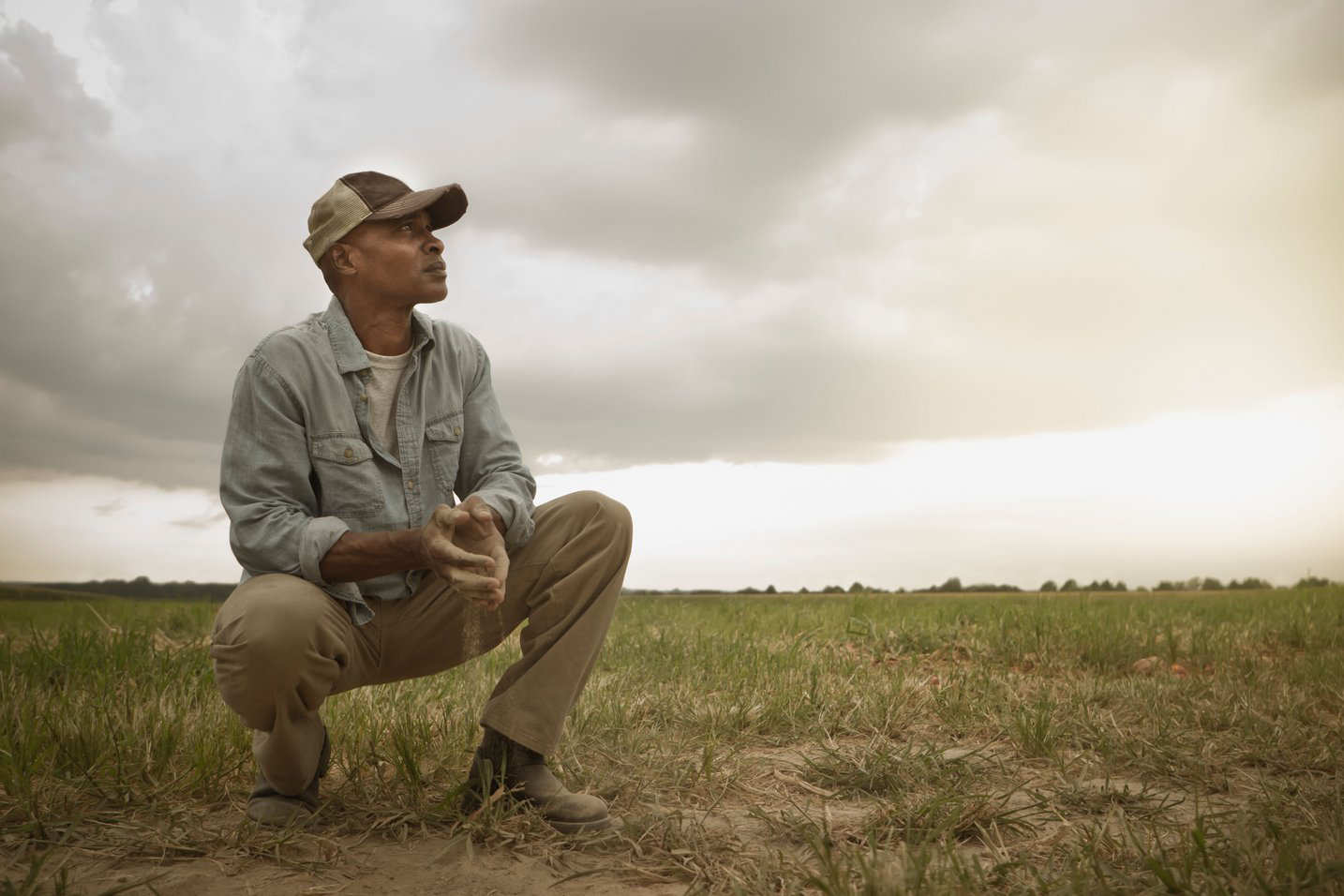
Pests and Diseases
It can feel like it’s a never-ending battle fighting against all the different critters out there that want to take your crops down.
Compaction
Layers of compacted earth result in soil erosion and they make it really tough for plant roots to penetrate deep into the soil profile.
Nutrient Deficiency
Soil fertility is a major problem around the world. This results in lower yields and produce that is nutrient deficient.
Drought and Flooding
As soil structure and organic matter content are degraded over time, the soil’s ability to infiltrate and hold water is compromised.
Low Crop Yields
Many farmers are experiencing diminishing crop yields despite the fact that they are pouring on more and more chemical fertilizer year after year.
Increasing Input Costs
For many farmers, the costs of chemical inputs seem to rise every year, making it harder and harder to earn a living.
Not a Farmer, Rancher, or Grower?
Interested in becoming a Soil Food Web Consultant,
Lab-Tech, or Biological Compost Producer?
Click here to learn more.
The Benefits of the Soil Food Web Approach
You know that soil health is essential to the success and longevity of your farm. We can help you rapidly regenerate your soil, so you can start seeing the results in the first year.
Improved Soil Fertility
With beneficial biology in the soil, plants get to control their own nutrition by exchanging exudates for the nutrients they need, when they need them. Click here to learn more.
Reduced Pests & Disease
The Soil Food Web protects plants from disease-causing organisms and pests in a number of different ways. Click here to watch the video about this.
Increased Yields
Improved nutrition and soil structure as well as protection against pests and diseases are some of the ways in which plants are positively affected, resulting in increased yields. Learn more.
Drought & Flooding
Beneficial soil microbes build soil structure, which enables water to better infiltrate clay soils while increasing the water-holding capacity of sandy soils. Increased organic matter is also very important. Learn more.
Compaction
With the Soil Food Web Approach, we enlist the help of beneficial microbes to build soil structure and we also adopt management practices such as no till to ensure that compaction doesn’t recur. Learn more.
Reduced Input Costs
Your plants can get what they need from the soil once you have the right biology in place. This includes nutrition and protection from pests and diseases. Click here to learn more.
Not a Farmer, Rancher, or Grower?
Interested in becoming a Soil Food Web Consultant,
Lab-Tech, or Biological Compost Producer?
Click here to learn more.
Learn how to Rapidly Regenerate YOUR Soil
With the Soil Food Web Approach
Ok, but will the Soil Food Web Approach work for me?
Will it work on my crops?
The Soil Food Web Approach has been used to regenerate soils on 6 continents, in many different environments and with numerous different crops, such as soybeans, corn, grains, vines, orchards, hemp, and all kinds of veggies.
All plants form symbiotic relationships with the microbes in the soil.
Will this fit my schedule?
This is a flexible online program, so you can work at your own pace. The Foundation Courses can be completed in as little as 4 weeks or as long as 12 months.
The Mentoring Program is also designed to be very flexible. You can book sessions with your mentor when you feel you need support.
I’m not a scientist…
Our training programs are designed for people with no scientific background.
Dr. Elaine has an informal teaching style that makes the lectures easy to follow.
You’ll have access to the Student Forum and monthly live Q&A sessions where your questions will be answered.
Consultant Case Studies
You could create a new income stream by supporting other farmers in your area.

Renald Flores
Market Garden Makeover (Sweden)
Soil Food Web Consultant, Renald Flores, reported an average increase in yields of 72% across 8 different types of crops on this market garden project. Includes: Potatoes, Cabbage, Onions, Kale, Fennel and more…

Todd Harrington
25,000 acres Idaho, USA
Soil Food Web Consultant Todd Harrington reports increases in yields as high as 136%. From pastures to alfalfa, potatoes, and beans, the biological methods introduced by Todd and his team produced remarkable results.
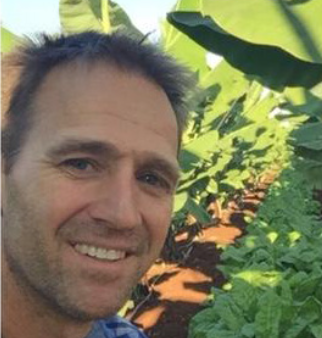
Shane Plath
5,000 acres South Africa
“Our farm was in serious trouble, but after implementing the SFW approach we increased our yield by 150% in a single season, and we were very successful to repeat this approach on different soils at different farms ….. We also cut many input costs such as fertilizers by at least 60%.
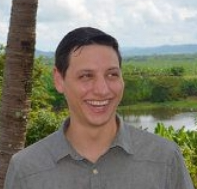
Miles Sorel
Ecuador, India, Peru, & USA
Terraforma saved one client $600 per acre and increased yields for another client by 146%. In this amazing webinar, Soil Food Web Consultant Miles Sorel presented case studies on projects from 4 different countries.
Not a Farmer, Rancher, or Grower?
Interested in becoming a Soil Food Web Consultant,
Lab-Tech, or Biological Compost Producer?
Click here to learn more.
Not a Scientist? Not a Farmer?
Not a Problem!
Dr. Elaine’s teaching style is accessible to anyone and,
remember, we offer a 100% money-back guarantee!

Curriculum:
YOU'LL GET
- 63 Lectures and Quizzes in the Foundation Courses (FC) by Dr. Elaine Ingham.
- 26 hours of Mentor Time to help you make your own compost and master the microscope.
- Cohort training experience with the optional 10-week Compost Intensive Program.
- Monthly Q&A Webinars with Dr. Elaine and other soil regeneration experts.
- Join the Soil Food Web Community where you can interact with hundreds of farmers and dozens of Soil Food Web Professionals.
- Access to the FC Student Forum where your questions will be answered by Dr. Elaine and her team.
- Certified Soil Food Web Lab-Technician status and free listing in the directory on Soilfoodweb.com (once you have successfully completed the Microscopy Proficiency Assessment).
- Downloadable materials including: Course Manuals, Lecture Slides, Glossary, and more.
- The Launch Your Lab Guidebook.
THEORY + PRACTICE
Regenerative Farmer Package
Study the science and application methods behind the Soil Food Web Approach in the Foundation Courses, then work with one of our highly-skilled mentors to create your own biological compost and master the microscope.
Once you’ve successfully completed this program, you will:
- Be certified as a Soil Food Web Lab-Technician, so you can use the microscope to assess the biology in your compost and in the soils of the farms in your region.
- Have the skills required to produce BioCompleteTM Compost that can be used to rapidly restore the soil biome.
- Be well on the way to becoming a successful Soil Food Web Consultant, Lab-Tech, or Compost Producer.
Included in the Regenerative Farmer Package
The Soil Food Web Foundation Courses
Foundation Course 1: Introduction to the Soil Food Web
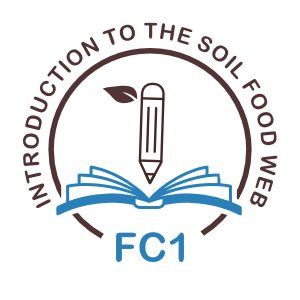
In Foundation Course 1 you will learn:
- About the damage that modern agriculture has done to soils all over the world.
- How Regenerative Agriculture is the soil-ution and how you can rapidly regenerate your soils with the Soil Food Web Approach.
- How the Soil Food Web Approach can be adopted on any scale and in almost any environment, with a multitude of crops.
- About the 4 major groups of Beneficial Microorganisms that are needed to restore ecosystem functions to your soil.
- How Beneficial Microbes work in harmony with your crops to nourish and protect them.
- How benefits such as increased yields, reduced erosion, reduced pest, disease and weed pressures etc. can be achieved.
- About several projects from around the world that Dr. Elaine Ingham has worked on personally.
- About some of the management practices you can adopt to ensure that the biology in your soils is not compromised.
- How soil structure is created by beneficial microbes, improving water infiltration in clay soils and better water retention in sandy soils. And how good structure enables plants and beneficial microbes to penetrate deep into the soil profile, improving plant health.
- How beneficial microbes access the abundance of nutrients stored in the parent material (think sand and clay particles) and how this is then made available to your plants.
- How plants influence the soil biome, by releasing sugary exudates that feed specific groups of beneficial microbes, in return for nutrients.
- How having a balanced soil biome can result in great benefits, such as Weed Suppression and Increased Carbon or Organic Matter content.
Foundation Course 2: Making BioComplete™ Compost
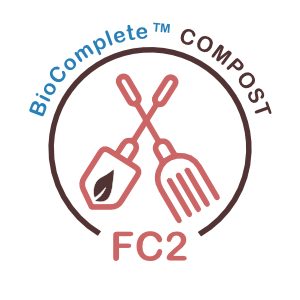
In Foundation Course 2 you will learn:
- About the different definitions of compost and why we consider it as a means of multiplying beneficial microbes instead of just a way of delivering nutrients to the soil.
- How to make your own Biological Compost, using Dr. Elaine’s close-control composting method that enables beneficial microbes to multiply rapidly, while suppressing detrimental microbes.
- Techniques that can be used to balance the biology in your compost, ensuring that the 4 main groups of microbes are present.
- How to apply Biological Compost to your soils so that beneficial microbes can interact with your plants in the root zone, offering nutrition and protection.
- About the various types of methods and equipment that can be used to produce Biological Compost, depending on scale. This includes vermicompost and hot-composting.
Foundation Course 3: Making BioComplete™ Extracts and Teas
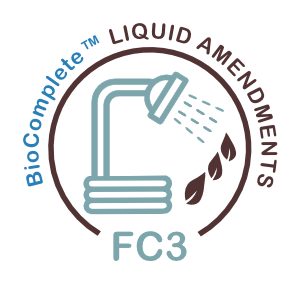
In Foundation Course 3 you will learn:
- How to produce Biological Extracts and Teas from your Biological Compost, using different types of equipment depending on the scale you are operating at.
- About the uses and application methods of Biological Extracts and Teas
- How to apply Biological Liquid Amendments to your soils using different equipment, depending on the scale of your project. And how you can use conventional spraying equipment with some minor modifications.
Foundation Course 4: Introduction to Microscopy
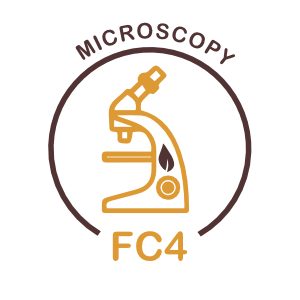
In Foundation Course 4 you will learn:
- How to correctly set-up and use a compound microscope.
- About the biological morphology of the 4 major groups of beneficial soil microorganisms.
- How to identify and quantify the key groups of beneficial microbes that all soils need in order to be fully functional, using the compound microscope. This will enable you to conduct your own soil biology assessments.
- How to process and interpret data.
- How to recognize microarthropods, algae, pollen and other objects in your soil.
Dedicated Mentoring
Compost and Microscopy Mentoring (Stage 1 of the Grower Training Program)
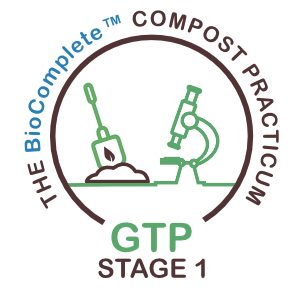
What You Will Learn
- You’ll be assigned to one of our highly trained Mentors who will guide you as you work towards mastering the art of making BioComplete™ Compost using the techniques you have studied in the Foundation Courses.
- You will also work 1-on-1 with your Mentor to develop your microscopy skills to the required standard to become a Certified Soil Food Web Lab-Tech.
- You’ll learn from the experience of others as your Mentor will be able to advise you on common mistakes to avoid, when making your compost.
You’ll have the option to join our new 10-week Compost Intensive program, where you’ll work in a cohort of 20 students through a structured weekly format, featuring live weekly lectures, followed by Q&A sessions with members of the mentoring team, and additional group sessions during the week. This new cohort format is designed specifically for folks who want to work and learn in a group setting and who want the opportunity to make lifelong connections with fellow students and future colleagues.
What’s Included
- 26 hours of total Mentor Time dedicated to helping you to make your own Biological Compost and Master the Microscope.
- Free listing in the directory of Certified Soil Food Web Lab-Techs, once you pass the Microscopy Proficiency Assessment (MPA).
- The Guide to Making Small Scale BioComplete™ Compost manual.
- The Certified Lab-Tech Program (CLP) Course Manual.
- The Launch Your Lab Guidebook.
Not a Farmer, Rancher, or Grower?
Interested in becoming a Soil Food Web Consultant,
Lab-Tech, or Biological Compost Producer?
Click here to learn more.
Package Features
Private Forum
You’ll get access to the Foundation Courses Forum where your questions will be answered by Dr. Ingham and her team.
Monthly Webinars
You can attend monthly Q&A webinars with Dr. Ingham, other members of the faculty, and prominent guest speakers.
The Compost Intensive Program
Develop your skills and make lifelong connections in this optional 10-week cohort training experience.
Certificate of Completion
You’ll get a completion certificate with the Foundation Courses and have the option of certifying as a Soil Food Web Lab-Tech.
Downloadable Material
You can download Lecture Slides, Course Manuals, and other printable materials to create your own library of reference materials.
Study the Science, Create your own Biological Compost,
and Master the Microscope
Regenerative
Farmer Package
$7,000
$3,199*
This offer will end at midnight on October 31st, 2024
What's Included:
- $1,801 OFF Foundation Courses
(Normally $5,000) - FREE BONUS: Stage 1 of the Grower Training Program
(Normally $2,000)
Pay in Full
Buy Now(One payment of $3,199)
Monthly Payments
Monthly Financing as low as 0% APR**
(U.S. residents only)
There are only 70 places available in the 2024 registration cycle
* With the Regenerative Farmer Package you are registering for the Foundation Courses at the price of $3,199 (that’s $1801 off the regular price of $5,000) and Stage 1 of the Grower Training Program for free (regular price $2,000).
**Rates from 0% APR or 10-36% APR. Payment options through Affirm are subject to an eligibility check and are provided by these lending partners: http://affirm.com/lenders. See http://affirm.com/licenses for important info on state licenses and notifications.

You’ll get a 30-day, no questions asked, money-back guarantee on the total price paid. The only condition is that you have watched fewer than 32 lectures of the Foundation Courses.
FAQs
Will it work in my region?
Dr. Elaine has used the Soil Food Web Approach to regenerate soils on 6 continents. We now have students in over 100 countries and so far we haven’t found anywhere in the world where the soil ecosystem cannot be restored. (Antarctica is the obvious exception since the soil isn’t accessible there!)
Will it work on all crops and plants?
All plants form symbiotic relationships with microorganisms in the soil. That’s because when plants first evolved on the land, around 500 million years ago, the world’s soils were already populated with microbes. So these relationships have been there from the beginning. Our persistent disturbance of the soil, with the plow and more recently with chemicals, has destroyed the balance that existed in the soil ecosystem. Fortunately, we can put that right very rapidly with the Soil Food Web Approach, which is all about harvesting microbes from the local area, multiplying the aerobic microbes using Dr. Elaine’s close-control composting system, and then re-introducing them to the soil. With regenerative agricultural techniques like no till, the soil biome is protected and so repeated treatments may not be necessary.
Will it work at a large and/or small scale?
The short answer is ‘yes’. Dr. Elaine has worked on large scale projects that cover thousands of acres. She has also worked on some smaller projects too. BioComplete™ Compost and liquid amendments can be produced at large scale, using industrial equipment and also at very small scale, using hand tools and home-made brewing kits. Of course, application at large scale is very different than it would be in someone’s garden, but the good news is that conventional spraying equipment and irrigation systems can be used to deliver BioComplete™ Liquid Amendments to the soil, with some very minor modifications.
Do I need a science background?
Our training programs are designed for people with no scientific or agricultural background. Dr. Elaine has an informal teaching style that makes the lectures easy to follow. You’ll have access to the Student Forum and monthly live Q&A sessions where your questions will be answered.
Will the program fit my schedule?
This is a flexible online program, so you can work at your own pace. The Foundation Courses can be completed in as little as 4 weeks or in as long as 12 months. The Mentoring Program is also designed to be very flexible. You can book sessions with your mentor when you feel you need support, and your mentor will be on hand to answer your emails. The program is designed for people with busy schedules.
Is this a cost-effective solution?
Dr. Elaine Ingham has spent decades collaborating with farmers in different parts of the world, working on a variety of different crop-types, to develop the Soil Food Web Approach.
One of her primary goals was to ensure that farmers could provide their crops with sufficient nutrients and with protection against pests and diseases, without the need to use expensive chemical inputs, such as fertilizers and pesticides. Please take a look at the Case Studies videos on this page where you can hear directly from Farmers and Consultants who are reporting great results and financial benefits when using Dr. Elaine’s techniques as part of their process.
In the Testimonial videos on this page, you will hear from some of the folks who have trained with Dr. Elaine and who have followed in her footsteps to establish themselves as Soil Food Web Professionals. Each of them works independently and they run their own businesses, but they are all part of the Soil Food Web community. Some of them had no background in Farming or Biology. Careers in this space include: Soil Food Web Consultants, Lab-Techs and Compost Producers.
Foundation Courses
What will I learn?
- About the various groups of microorganisms that make up a fullyfunctional soil ecosystem, and how their interactions result in a constant flow of nutrients being made available to plants and trees.
- How plants and trees control the army of microorganisms in their root zones. Plants feed specific groups of microorganisms in order to harvest the particular nutrients required at any given moment. This results in vibrant, healthy plants and in supernutritious fruits and vegetables.
- That there is an abundance of nutrients locked-away in the crystalline structure of the mineral particles that makeup all of the world’s soils – from the desert sands to prairies and forests, there is no soil on earth that is incapable of providing all the nutrients that plants require. The missing-link is the army of soil microorganisms that can access these nutrients and make them available to plants.
- How beneficial soil microorganisms prevent diseases and pests from attacking plants. By occupying infection sites all over the roots and all of the above-ground parts of the plant, beneficial microorganisms make it impossible for the ‘bad-guys’ to get access to the plant. In addition to this, beneficial microorganisms create aerobic conditions in which the ‘bad guys’ (which are mostly anaerobes) cannot survive.
- That beneficial microorganisms build structure in the soil, thus preventing soil erosion whilst simultaneously improving water-holding capacity, infiltration and oxygenation. Having structure in the soil enables roots to go much deeper into the ground, where they can access greater quantities of water and nutrients.
- About the way in which the presence of beneficial fungi results in diminished weed pressure. Have you ever noticed how there are very few weeds to be found in a forest?
- How introducing the Soil Food Web can drastically increase the ability of a soil to capture and store carbon from the atmosphere.
- The history of agriculture and how certain practices have resulted in the destruction of the soil food web in so many of the world’s soils.
- Basic plant physiology and biochemistry. The course covers the basics that are required in order for you to be able to fully understand the processes that are taking place in a living, functional soil.
- About how the soil food web has been reintroduced to over 5 Million acres worldwide. You will review a number of case-studies that demonstrate the effectiveness of the soil food web and how it can be implemented on projects of any scale, any crop and in any climate.
- How to make and apply BioComplete™ compost and liquids.
- About the different kinds of equipment you can use to make and apply the amendments you make.
- The farming practices that are harmful to soil biology and what farmers can do to avoid them.
- How to quantify the different organism groups in a soil, compost or liquid sample, using the compound microscope. This will enable you to measure results as they happen underground and before they happen above ground.
What's included in FC1?
In Foundation Course 1 you will learn:
- About the damage that modern agriculture has done to soils all over the world.
- How Regenerative Agriculture is the soil-ution and how you can rapidly regenerate your soils with the Soil Food Web Approach.
- How the Soil Food Web Approach can be adopted on any scale and in almost any environment, with a multitude of crops.
- About the 4 major groups of Beneficial Microorganisms that are needed to restore ecosystem functions to your soil.
- How Beneficial Microbes work in harmony with your crops to nourish and protect them.
- How benefits such as increased yields, reduced erosion, reduced pest, disease and weed pressures etc. can be achieved.
- About several projects from around the world that Dr. Elaine Ingham has worked on personally.
- About some of the management practices you can adopt to ensure that the biology in your soils is not compromised.
- How soil structure is created by beneficial microbes, improving water infiltration in clay soils and better water retention in sandy soils. And how good structure enables plants and beneficial microbes to penetrate deep into the soil profile, improving plant health.
- How beneficial microbes access the abundance of nutrients stored in the parent material (think sand and clay particles) and how this is then made available to your plants.
- How plants influence the soil biome, by releasing sugary exudates that feed specific groups of beneficial microbes, in return for nutrients.
- How having a balanced soil biome can result in great benefits, such as Weed Suppression and Increased Carbon or Organic Matter content.
What's included in FC2?
In Foundation Course 2 you will learn:
- About the different definitions of compost and why we consider it as a means of multiplying beneficial microbes instead of just a way of delivering nutrients to the soil.
- How to make your own Biological Compost, using Dr. Elaine’s close-control composting method that enables beneficial microbes to multiply rapidly, while suppressing detrimental microbes.
- Techniques that can be used to balance the biology in your compost, ensuring that the 4 main groups of microbes are present.
- How to apply Biological Compost to your soils so that beneficial microbes can interact with your plants in the root zone, offering nutrition and protection.
- About the various types of methods and equipment that can be used to produce Biological Compost, depending on scale. This includes vermicompost and hot-composting.
What's included in FC3?
In Foundation Course 3 you will learn:
- How to produce Biological Extracts and Teas from your Biological Compost, using different types of equipment depending on the scale you are operating at.
- About the uses and application methods of Biological Extracts and Teas
- How to apply Biological Liquid Amendments to your soils using different equipment, depending on the scale of your project. And how you can use conventional spraying equipment with some minor modifications.
What's included in FC4?
In Foundation Course 4 you will learn:
- How to correctly set-up and use a compound microscope.
- About the biological morphology of the 4 major groups of beneficial soil microorganisms.
- How to identify and quantify the key groups of beneficial microbes that all soils need in order to be fully functional, using the compound microscope. This will enable you to conduct your own soil biology assessments on-farm.
- How to process and interpret data.
- How to recognize microarthropods, algae, pollen and other objects in your soil.
Are the courses all online?
Yes, the Foundation Courses are 100% online, theory-based courses. You will watch a series of lectures and take a short quiz after each one.
Are the courses self paced?
Yes, they are. You’ll be able to login at any time, watch a lecture as many times as you like, then prepare for the short multiple-choice quiz that follows each lecture.
When can I start?
You can start as soon as you sign up.
Can I see a breakdown of the Foundation Course Lectures?
There are 63 lectures total in all four Foundation Courses. To see the full breakdown of the Foundation Courses and the lecture titles, please click here.
How much do they cost?
The regular price for the 4 courses is $5,000. With the October, 2024 offer you pay $3,199 and you get lots more FREE!
How long will it take me to complete them?
Students typically require about 150 hours in order to complete the FC at a reasonable pace.
We expect that a student can complete the FC in 4 weeks, if studying full-time. The maximum time allowed to complete the FC is 12 months. You can apply for an extension if you need it.
Do I need any qualifications to start the courses?
The courses are designed for people with no background in the field.
Will this course enable me to find employment as a Soil Food Web Consultant?
Students wishing to pursue a career as a Soil Food Web Consultant will need to progress from the FC to the Consultant Training Program.
What do graduates do when they have completed their training?
Some become Soil Food Web Consultants who help farmers, ranchers, and growers to transition away from using chemicals to a biological/regenerative farming technique. Others focus on producing great compost, which they then can sell to soil consultants or direct to farmers. And others become Soil Food Web Lab-Technicians who perform biological assessments for farmers and growers, or for Soil Food Web Consultants.
Grower Training Program
What's included in GTP Stage 1?
What You Will Learn
- You’ll be assigned to one of our highly trained Mentors who will guide you as you work towards mastering the art of making BioComplete™ Compost using the techniques you have studied in the Foundation Courses.
- You will also work 1-on-1 with your Mentor to develop your microscopy skills to the required standard to become a Certified Soil Food Web Lab-Tech.
- You’ll learn from the experience of others as your Mentor will be able to advise you on common mistakes to avoid, when making your compost.
What’s Included
- 26 hours of total Mentor Time dedicated to helping you to make your own Biological Compost and Master the Microscope.
- Free listing in the directory of Certified Soil Food Web Lab-Techs, once you pass the Microscopy Proficiency Assessment (MPA).
- The Guide to Making Small Scale BioComplete™ Compost manual.
- The Certified Lab-Tech Program (CLP) Course Manual.
- The Launch Your Lab Guidebook.
How long will it take to complete Stage 1 of the GTP?
Students typically need to make at least 6 compost piles before they can achieve the required standards for passing the compost practicum. If you have the resources, you can make multiple piles, with varying recipes, simultaneously, to save time. Each pile will require up to 28 days to complete, once built. A reasonable time-frame for the compost practicum is 3-12 months.
CTP students are expected to complete the CLP while simultaneously working on Stage 1 of the CTP.
Students are expected to complete all three stages of the CTP within 2 years (24 months). The maximum allowable time for completion of the CTP is 2.5 years (30 months), after which your enrollment in the CTP will expire.
Do I need any qualifications to join the Grower Training Program?
The courses are designed for people who are either Farmers, Ranchers, or Growers. While you don’t need a background in science or any other qualifications, you will need access to some land and other resources. If you are considering taking this course before you purchase land, that’s ok, so long as you have some space and resources to make your compost (and to practice microscopy) in Stage 1, and to make your liquid amendments in Stage 2. You will need the land by the time you reach Stage 3 for implementation.
Will I need to buy any equipment to complete the GTP?
You will need to purchase several pieces of equipment in order to complete each stage. The precise budget will depend on the size of your operation. Your mentor will be able to advise you on equipment selection. The minimum requirements are likely to cost at least $1,000. You may be able to repurpose some of your existing equipment e.g. spraying rigs for the application of liquid biological inoculate.
Can I complete the practical training at the Soil Food Web School?
You can complete stages 1 and 2 of the program by attending a 12-day workshop. Please contact student support ([email protected]) for more information on the CTP Accelerator Workshops scheduled in early 2025.
Is the Certified Lab-Tech Program included in the Grower Training Program?
Yes it is. GTP students are required to complete the CLP in Stage 1 of the GTP. Click here for more info.
Can I get certified as a Consultant if I am in the Grower Training Program (GTP)?
The GTP is intended for farmers, growers, and ranchers who do not wish to become certified consultants but if you change your mind during your program (before you enter Stage 3), you can transfer from the GTP to the Consultant Training Program (CTP) and complete Stage 3 of the CTP. This will enable you to be certified as a Soil Food Web Consultant.
Can I use the trademarked term BioComplete™?
The term BioCompleteTM is used to refer to compost and liquid amendments that meet the minimum biological requirements defined by Dr Elaine Ingham as being required in order for the amendment to be effective in restoring the soil biome, when correctly applied. You will be trained how to make these amendments in the Grower Training Program.
As this is a trademarked term, protected under copyright law, it can only be used with written permission of the Soil Food Web School.
Not a Farmer, Rancher, or Grower?
Interested in becoming a Soil Food Web Consultant,
Lab-Tech, or Biological Compost Producer?
Click here to learn more.
Here's what some of our students are saying
Meet the Pros
Meet some of the Soil Food Web Professionals who are out there making the change happen in their communities.
Soil Food Web Consultant
California
After a successful career as a program manager in IT, Brian decided to follow his passion for the environment and healthy food. He now runs a successful consultancy, Sprouting Soils. His clients include vineyards, orchards. and cannabis growers.
Soil Food Web Consultant
Connecticut
Todd was one of the first to ever train with Dr. Elaine Ingham. He’s built a successful business, producing Biological Soil Amendments and providing consultancy services. Todd’s company, Harrington’s Organics, employs 7 people and has numerous clients around the US and beyond.
Soil Food Web Consultants
Oregon
Nick has focused extensively on soil health since his time as an undergraduate at Oregon State where he discovered the works of Dr. Ingham. Now he spends his time sharing his exploration and implementation of soil health principles and techniques with clients in the Western U.S and beyond.
Not a Farmer, Rancher, or Grower?
Interested in becoming a Soil Food Web Consultant,
Lab-Tech, or Biological Compost Producer?
Click here to learn more.
Meet some of your Instructors
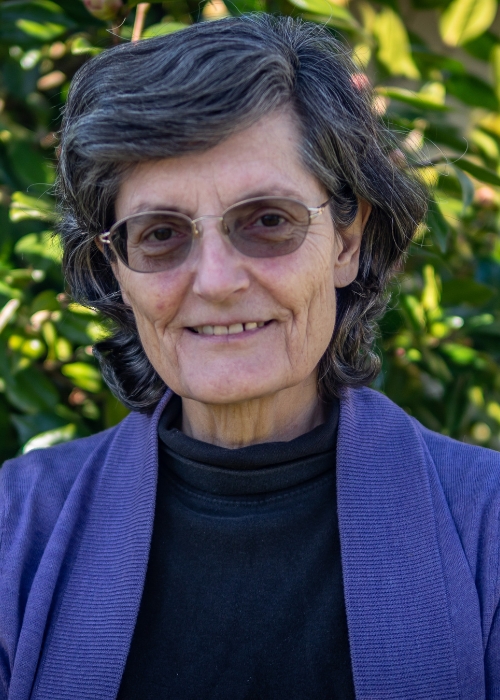
Dr. Elaine Ingham PhD
Founder & President
Dr. Elaine Ingham is the Founder, Principal Ambassador, and Science and Research Advisor of the Soil Food Web School. She holds a Ph.D. in Soil Microbiology and has had a distinguished academic career, including roles at Oregon State University and the Rodale Institute. Dr. Ingham has authored numerous scientific papers, book chapters, and technical reports, focusing on soil ecology and sustainable agriculture. She’s a globally recognized leader in Soil Food Web sciences and has presented at international conferences. In 2019, she co-founded the Soil Food Web School, which has grown to over 3,000 students. Dr. Ingham remains actively involved in student engagement and hosts global webinars to promote farming without pesticides and inorganic chemicals.
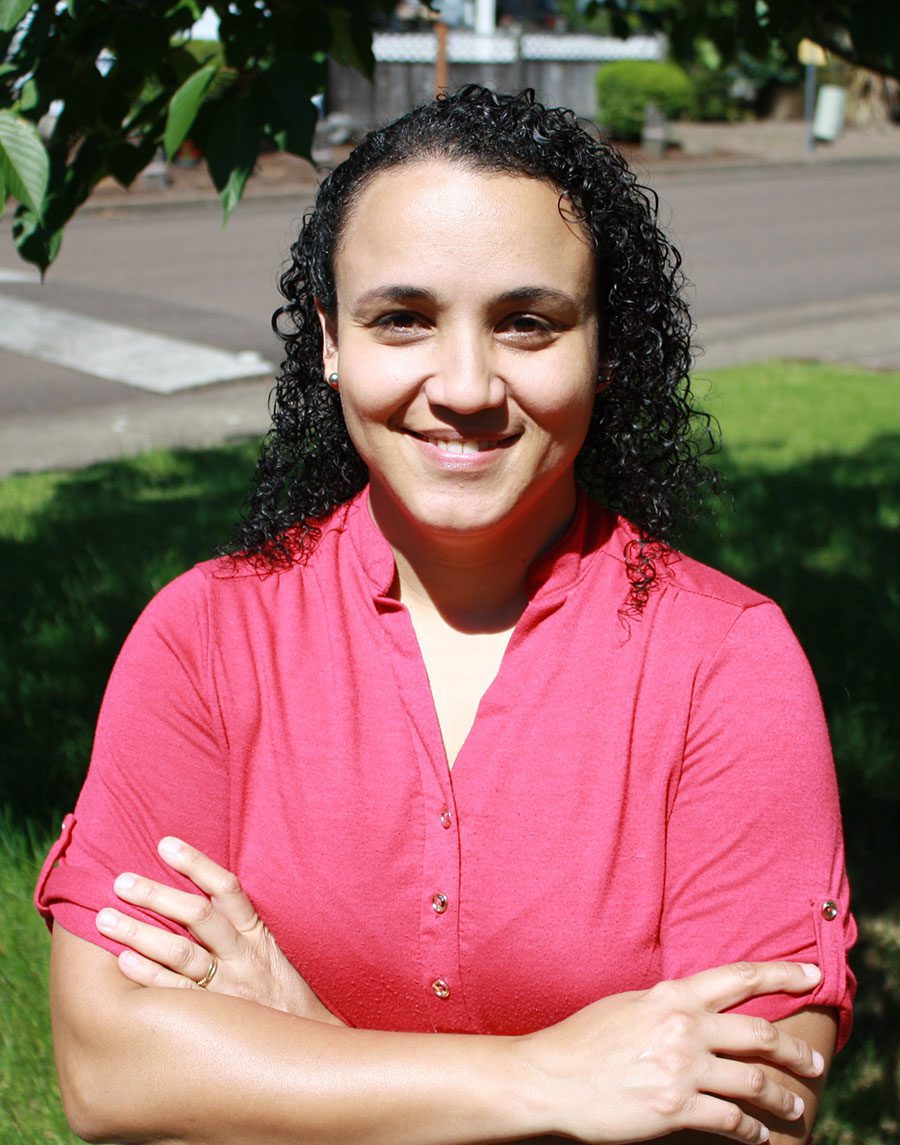
Dr. Carla Portugal PhD
Senior Scientist
Dr. Carla Ribeiro Machado e Portugal is a multilingual professional with expertise in environmental sciences and agriculture. She holds a Ph.D. in Environmental Sciences and has extensive experience in consulting, research, and education. Dr. Portugal has worked with Brazilian government entities on sustainable agriculture and water management projects. She co-founded a consultancy company in Brazil and has been involved with UNESCO. Since 2019, she has been affiliated with the Soil Food Web School as an Instructor, Mentor, Researcher, and Translator, guiding international students with her diverse skills.
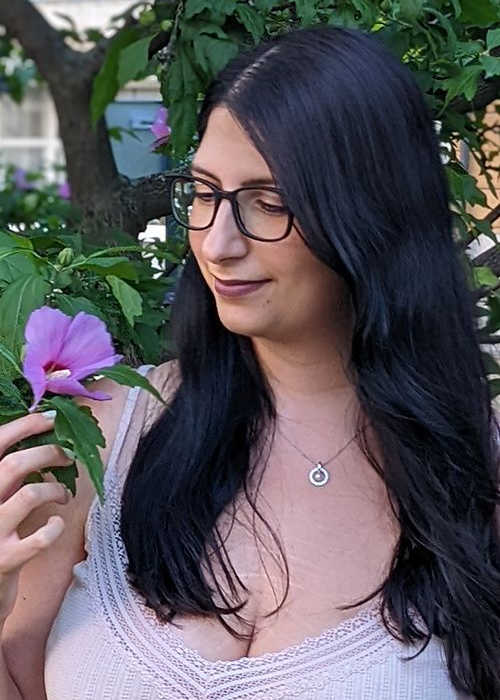
Dr. Elina Psara PhD
Mentor Team Lead
Elina holds a Ph.D. from Ulster University, focusing on nutrition’s impact on human health. She also has an MSc from Imperial College London and a BSc from the University of Birmingham, all in human biology-related fields. During her doctoral studies, Elina recognized the importance of all trophic levels in the food chain for human health, ultimately leading to an understanding of the crucial importance of soil health. She discovered the Soil Food Web approach, and its ability to cost-effectively regenerate soils. Now part of the Soil Food Web family, Elina guides students with the goal of enhancing soils and ecosystems globally. She’s enthusiastic about conducting further research into the connection between soil health and human health through nutrient density.

Dora Tkalec
SFW Consultant & Mentor
Dora Tkalec, based in Tampere, Finland, is a teacher and passionate gardener who discovered permaculture in 2012. This led her to explore compost and soil’s role in ecosystems. Since 2020, she has been studying and practicing the Soil Food Web approach to soil regeneration. As an educator, Dora shares knowledge about soil ecosystem regeneration and sustainable agriculture with vocational students, farmers, and landscape professionals in her region. She has a particular interest in traditional European mountain pastures, old school orchards, and vegetable gardens. Dora believes in the power of understanding natural systems and human cooperation to create positive change, with a focus on producing effective bioactive compost.
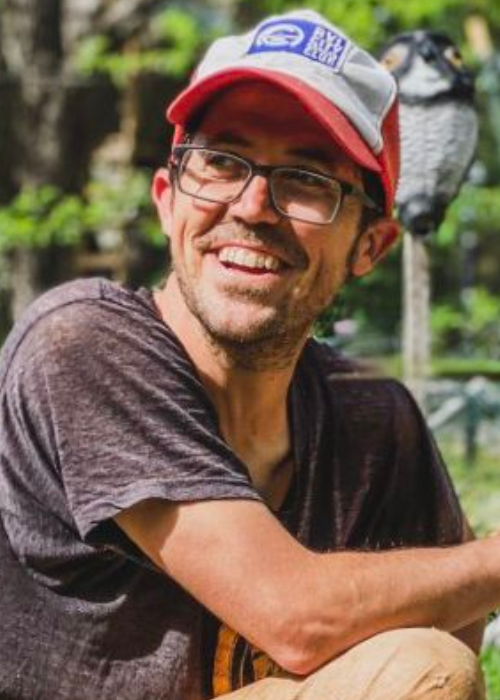
Tommy Tepper
SFW Mentor
Tommy Tepper is an Instructor at the Soil Food Web School, bringing a unique background that combines sociology, communication, farming, and education. After college, he discovered his passion for growing food while working on an organic farm in Rhode Island. Tommy then spent over a decade teaching middle school students while maintaining involvement in community gardens and personal food production. His role at the Soil Food Web School allows him to merge his two passions: teaching and agriculture. Tommy values the opportunity to work with diverse students and mentors globally, finding fulfillment in this intersection of education and sustainable farming practices.

Nick Padwick
Farmer, SFW Consultant & Mentor
Nick is an experienced farmer and agricultural expert with over 40 years in the field. He has managed large estates globally, won numerous awards, and created the Farm-to-Fork program to educate children about food production and soil health. Currently, Nick serves as the Estate Director at Wild Ken Hill in Norfolk and is a leading advocate for regenerative agriculture in the UK. Recognizing the importance of soil ecology, he became a qualified consultant through Dr. Elaine’s Soil Food Web. Nick is passionate about supporting farmers in transitioning to regenerative practices and has launched Wild Soils to provide consultancy services to farms in the UK and internationally. He also produces compost at very large scale!

Ib Borup Pedersen
Farmer, SFW Consultant & Mentor
Ib is a Danish farmer with lifelong experience in agriculture, including 20 years of owning a 110 ha farm with a pig unit. He began transitioning from conventional to organic farming in 2010, starting with organic strawberries. Since 2017, Ib has been teaching at a Danish boarding school, managing its 46 ha organic farm and educating students on organic farming and Soil Food Web (SFW) methods. He has conducted extensive SFW field trials at the school and on nearby farms, gaining experience in various crops and settings. With his technical background, Ib is developing practical systems for implementing SFW solutions on both organic and conventional farms. His goal is to make the Soil Food Web approach accessible and cost-effective for farmers and growers in Denmark.


